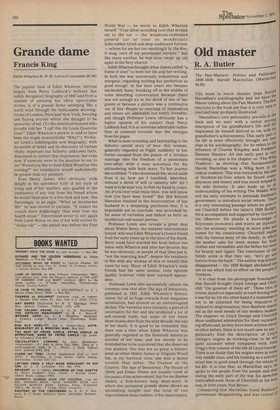Grande dame
Francis King
Edith Wharton R. W.S. Lewis (Constable £6.50) The popular view of Edith Wharton, derived largely from Percy Lubbock's brilliant but subtly derogatory biographyof 1947 and from a number of amusing but often apocryphal stories, is of a grande dame sweeping like a north wind through the fashionable drawingrooms of London, Paris and New York, freezing and flaying anyone whom she thought to be unworthy of her. (To the American hostess who proudly told her "I call this my Louis Quatorze room", Edith Wharton's answer is said to have been the single monosyllable "Why?"). Professor Lewis's indefatigable new biography, with its wealth of detail and its discovery of certain vitally important but hitherto unknown facts, does-much to correct that impression; but even now, if someone were in the position to say to me "Would you like to meet Edith Wharton this evening?" my trepidation would undoubtedly be greater than my pleasure.
Even Henry James, who obviously took delight in the splendour both of her style of living and of her intellect, also quailed at the imminence of any visit from the friend whom he would liken now to a fire-bird and now, less flatteringly, to an eagle. "What an incoherent life!" he was moved to exclaim. "It makes me crouch more dodderingly than ever over my hearth-stone." Determined never to stir again from Lamb House on one of her wild sorties by "motor-car" — the period was before the First World War — he wrote to Edith Wharton herself; "Your silver-sounding toot that invited me to the car — the wondrous-cushioned general car or your so wondrously india-rubber-tYred and deep-cushioned fortune — echoes for me but too mockingly in the dim, if snug, cave of my permanent retraite." But like many another, he was soon swept up yet again in the fiery chariot.
Edith Wharton brought what James called "a frame of steel" to both her life and her writings In both she was enormously industrious and energetic, regarding nothing but perfection as good enough. In her later years she became intolerably fussy, breaking off in the middle of some absorbing conversation because there was not enough ice in the drink of one of her guests or because a picture was a centimetre out of line. People so exacting of themselves and others are admirable but rarely loveable; and though Professor Lewis obviously has a higher opinion of his subject than Percy Lubbock had, it is as someone admirable rather than as someone loveable that she emerges from his pages.
What is most revealing and fascinating is the hitherto untold story of how this woman, generally regarded as frigid, suddenly in her forties escaped from the prison of a loveless marriage into the freedom of a passionate love-affair with a man notorious for his philandering with both sexes. To her journal she confided: "I who dominated life, stood aside from it so, how am I humbled, absorbed, without a shred of will or identity left! All I want is to be near you, to feel my hand in yours.
Ah, if you ever read these lines, you will know how you have been loved!" But this belated liberation resulted in the incarceration of her husband in a deepening psychosis. that, it is impossible not to conclude, was provoked by his sense of exclusion and failure as both an intellectual and sexual partner.
Professor Lewis also reveals a great deal about Walter Berry, the eminent international lawyer, who was Edith Wharton's closest friend from her early years up to the time of his death. Berry could have married her both before her union with Wharton and after her divorce; but he was obviously, as people of that time put it, "not the marrying kind", despite his tendency to flirt with any woman of title or wealth that came his way. Many of Edith Wharton's male friends had the same sexless, even epicene quality, however virile their outward appearance.
Professor Lewis also successfully refutes the common view that after The Age of Innocence, published in 1921, Edith Wharton's literary career, for all its huge rewards from magazine serialisation, had entered on an uninterrupted decline. The 'twenties were certainly a period of uncertainty for her and she produced a lot of soft-centred trash; but some of her finest short-stories date from the next decade, the one of her death. It is good to be reminded that there was a time when Edith Wharton was generally regarded as the foremost American novelist of her time; and not merely to be reminded but to be convinced that she deserved that position. She was not as great a literary artist as either Henry James or Virginia Woolf but, in my heretical view, she was a better novelist than either. The Custom of the Country, The Age of Innocence, The House of Mirth and Ethan Frome are usually cited as the peaks of her achievement; but for me Bunner Sisters, a little-known long short-story in which this pampered grande dame shows an astonishing insight into the lives of two impoverished dress-makers, is her masterpiece.
































 Previous page
Previous page